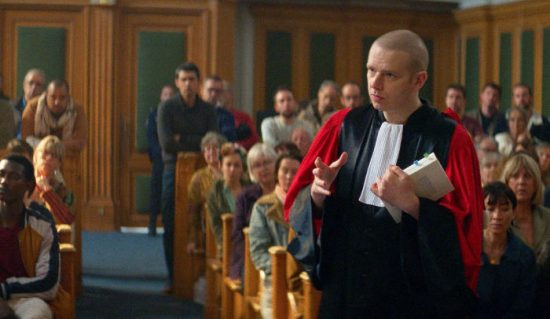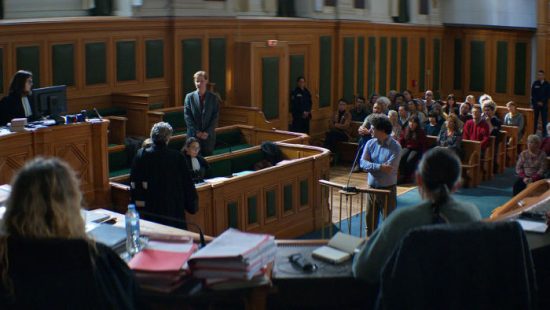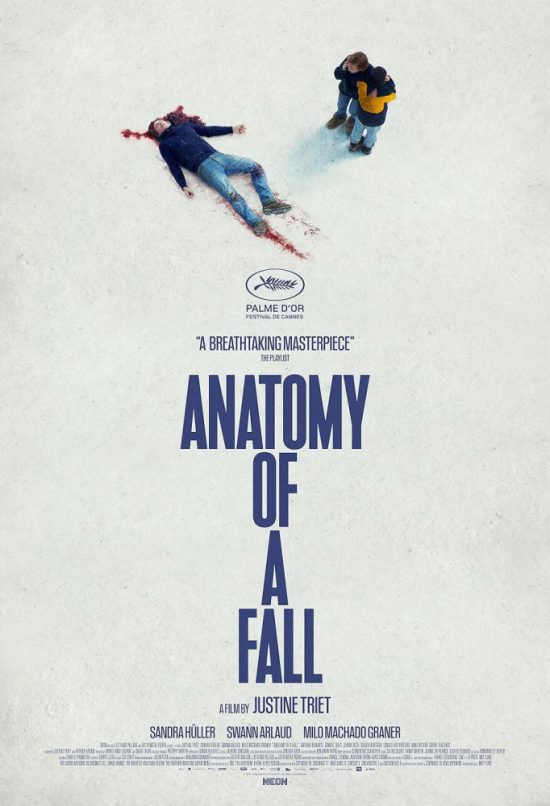French Film Festival 2023 Review: Anatomy of a Fall / Anatomie d’une chute
Directed by Justine Triet
Starring Sandra Hüller, Swann Arlaud, Milo Machado-Graner, Antoine Reinartz, Samuel Theis, Jehnny Beth
The first movie I caught at this year’s annual French Film Festival (taking place in multiple cities around the UK this month) was Anatomy of a Fall, which bagged director and co-writer Justine Triet the coveted Palme D’or at Cannes (making her only the third female director to win the award, which is not a good look for Cannes, but that’s another story). At first glance you may assume this to be a fairly standard courtroom thriller / whodunnit: a husband in a rocky marriage dies in mysterious circumstances, his wife was the only other person in their mountainside chalet near Grenoble. Was is accidental, a fall while repairing the house? A deliberate suicide? Or a rage-fuelled murder? The suspicions of the authorities fairly inevitably settle on the author wife, Sandra Voyter (Sandra Hüller), and a courtroom battle looms…
Except this does not go the way I thought it might, instead leading us into a far murkier emotional mess of a relationship, of accusations and regrets and arguments. The couple’s world had been upset when her husband, Samuel Maleski (Samuel Theis), busy with other projects (teaching, repairing the house they intended to rent out for more income, trying to get his own writing career going), neglects to pick up their son from school, asking a babysitter to do it at the last minute. Arriving late, the babysitter and their son Daniel (Milo Machado-Graner) are involved in a bad accident, the effects of which leaves the young boy only partially sighted, leaving simmering resentments and guilt.
Sandra turns to an old friend, Vincent Renzi (Swann Arlaud), who is now a lawyer, for help, as it is clear the police investigating the death do not believe it is an accident. With a prosecution looming, he starts interrogating her himself, trying to establish what could have happened, the state of the couple’s relationship, and bringing in his own forensics experts to counter those of the prosecution. Along the way this slowly drags every murky element of Sandra and Samuel’s life out into the unforgiving glare of the courtroom and public reporting, revealing aspects which do not paint her in the best light, giving ammunition to the prosecutor, who, lacking a smoking gun (so to speak), has to rely on these more circumstantial matters to convince the court of her guilt.
The courtroom drama, which in other hands may have been heavy-handed, or overly dramatic and over-played, here is handled deftly – despite what is going on, you feel sympathy for these characters, as every formerly private piece of their lives is pulled out and aired in public, being used by the prosecution or defence to pillory or defend them. It’s not hard to empathise at these points – even if we had done nothing, had nothing really bad to hide, which of us would want our most private moments with a partner or family or friends open to the scrutiny of total strangers, who will judge you on it? How easily could a heated argument between two people be taken by others later and used as “evidence” against them for other possible actions? How do you defend against that when it means having to tell of less than savoury moments by the other (now deceased) partner, does that make her look better or even worse?
Add in their young boy being dragged into this (he refuses the judge’s request not to be in the courtroom), having to hear all of these details of his parents and their unravelling life prior to his father’s death, and you have a very heady, emotional trip. And then there’s the matter of the audio recording Samuel made secretly when arguing with his wife…
Anatomy eschews the more usual flashback scenes you often get in these kind of films (save for one main scene, quite effectively handled, fading in as we hear the audio recording, then back out to the courtroom at a critical moment, leaving us only hearing the event with the jury, not seeing it, a powerful moment). Triet and Hüller make the brave decision to craft events and two lead characters who are simultaneously vulnerable, evoking sympathy, but at the same time also often quite unlikeable, clearly selfish, driven more by their own motivations and goals than being a couple or family, and this is sustained throughout. I think both deserve kudos for this – it’s no mean feat to give us characters like that, yet still make us emotionally invested in them, and it makes them dramatically more satisfying than a simpler good partner / bad partner dynamic.
It’s a two and a half hour film, but I never felt the length, it never felt like it was dragging, it remained compelling all the way through. A compelling and engrossing French film, deserving the attention it has rightly been receiving.













